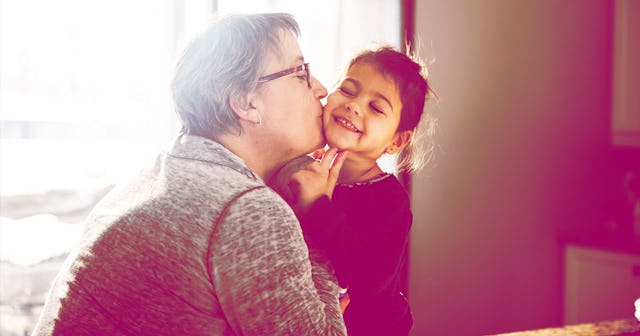The 'Grandmother Hypothesis' Says Our Nanas Were Crucial In Evolution—Because DUH

I should not have survived my premature birth. I was born in 1982, three months early, and weighed 1lb and 10oz. My parents were young teenagers who floated through life lusting after one another, until they fell out of lust and tried to fall in love with me, their sickly daughter. They ultimately failed, leaving me in the capable hands of my maternal grandmother.
Without her, I just may have died, neglected by parents who couldn’t even take care of themselves or their marriage. But in my grandmother’s care, I had a hot meal every day, lessons instilled in me about cleanliness (and Godliness), and a clear view of what grit felt and looked like. As a child, it was my grandmother who was my anchor, who helped me keep my feet on the ground and grow into the person I am today.
An anthropologist from the University of Utah, Kristen Hawkes, says that grandmothers help instill in us “a whole array of social capacities that are then the foundation for the evolution of other distinctly human traits, including pair bonding, bigger brains, learning new skills and our tendency for cooperation.” I am a living testament to how one’s life can be impacted thanks to Grandma.
The Grandmother Hypothesis sheds light on why we, as mothers, just may live a long life. In Lindsay Abrams’s essay in The Atlantic, she notes the work of researchers Kristen Hawkes and James O’Connell. She shares, “The Grandmother Hypothesis goes further than to establish the importance of grandmas. In our early years as a species, the theory goes, older women helped gather food for their offsprings’ offspring. In so doing, they were freeing up their daughters to have more children, more quickly. So the most evolutionarily fit grandmothers have the most grandchildren, to whom they pass on their longevity-promoting genes.”
Jose Luis Pelaez Inc/Getty
Researcher Sacha Engelhardt found in one of her studies that women who lived over 200 miles away from their mothers, their kids’ grandmothers, had 1.75 fewer kids than their sisters who lived closer to Mom. My grandmother was like the Energizer Bunny; she just kept going. She would wake me up every morning, and walk me through cleaning up my room and making my bed. She would do our laundry, clean our house, and make breakfast, lunch, and dinner, every day at home for my siblings and me. My grandmother raised me and my two siblings. She stepped in to fill the shoes my mother could not. Everyone benefits when a good Grandma is around.
In a study conducted in Finland, a toddler who had a grandmother between the ages of 50 and 75 in their lives had a greater chance of surviving. Grandma’s help is the most valuable and needed between the ages of 2 and 5. However, as the child gets older, Grandma’s presence holds less of an impact due to her mortality rate; as the mortality rate increases, Grandma’s ability to help decreases. These studies say “that together, these results help explain why selection has extended human lives past our reproductive prime, but only up to a point. Grandma can help when her grandchildren are growing up and she is likely in her 50s, 60s, and early 70s. As both of these studies demonstrate, grandmas can make a big difference in these years, and that reproductive boost helps push human life past the normal finish line of old age.”
Grandma’s presence matters, no matter her age. As our kids get older and our need for extra hands-on help decreases, we can still rely on our moms (or grandmothers) to give us knowledge, to impart their wisdom to us. Some may consider it criticism or overbearing at times, but no matter what you call it, their stories matter — as does their advice. My grandmother, who turns 82 in a few months, still shares her stories with us, even the mundane. And we listen with interest, just as she did for me all of those years ago. We may live states apart but, she keeps us connected even without FaceTime or Skype sessions (she doesn’t know how to use either).
I know that our grandmas won’t be around forever, but when we call on them, they will continue to show up for us and for our kids. Just as grandmas have for thousands of years.
This article was originally published on